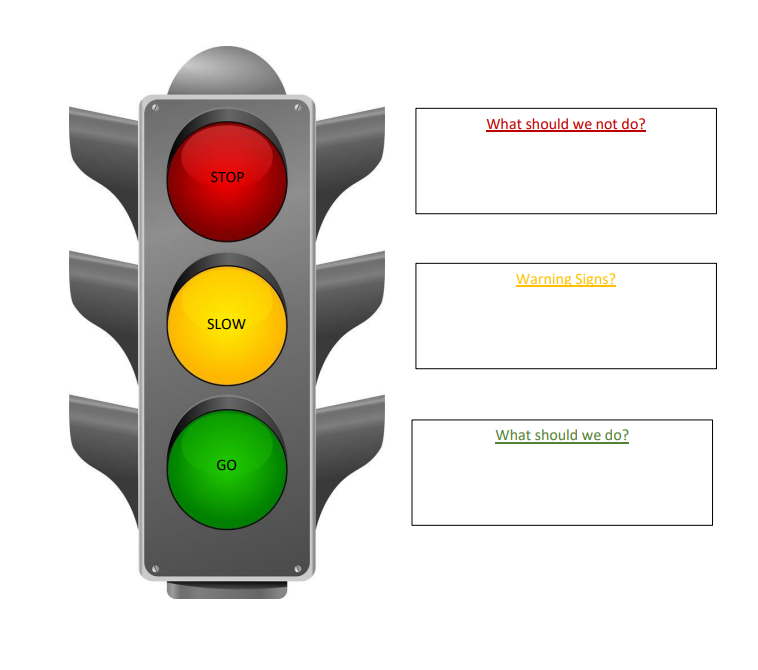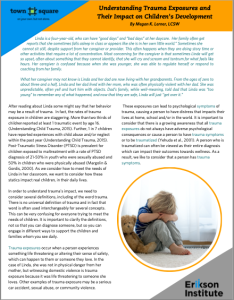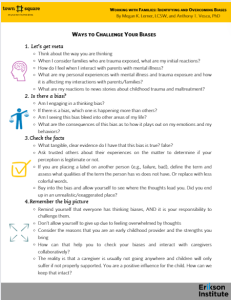From Megan K. Lerner and Anthony T. Vesco’s presentation on Strategies for Managing Stress and Trauma-Related Distress in Preschoolers, the Stoplight can be completed with individual children or as a group to teach self-regulation skills, as seen in the presentation here (start at 52:00):
Understanding Trauma Exposures and Their Impact on Children’s Development
This printable handout by Megan K Lerner, LCSW supports adults in understanding how children can be impacted by trauma.
This resource from Megan K. Lerner, LCSW and Anthony T. Vesco, PhD, will support providers in addressing the thoughts that can inhibit productive partnerships with families.
By Megan K. Lerner, LSCW, and Anthony T. Vesco, PhD
If you are participating in the 2023-24 Philly Pre-K cohort and would like to receive for credit at Erikson towards your annual incentive, please email info@townsquarecentral.org with three takeaways from this session (information you found interesting, helpful, or will use in your program) along with your full name. Note that attendance at live events is mandatory for PQAS credit.
This module will review the guidelines for developmentally appropriate technology use and how to choose high quality technology tools. Included are ideas and resources for both low and high tech tools that can be used to enhance children’s experiences. Ways to manage children’s technology use and strategies to include and communicate with families about technology use will be shared. Please Note: Your progress through the modules are logged. If you are completing a module in much less time than approved by Gateways or skipping content you may not receive credit for this module.
This module reviews concepts from other modules in the environment series. Stories of both small and big changes from family child care providers will be shared to show the impact of making changes in your environment. Providers will be invited to consider changes they might make in their own environments.
Please Note: Your progress through the modules are logged. If you are completing a module in much less time than approved by Gateways or skipping content you may not receive credit for this module.
In this module family child care providers will be invited to consider the ways the environment can support communication with families and the community. This module will illustrate a variety of ways to share information to communicate effectively with families as well as support your family child care business. Providers will also learn about documenting children’s learning experiences as a means of communicating children’s growth to families and also for sharing your family child care business with the community.
Please Note: Your progress through the modules are logged. If you are completing a module in much less time than approved by Gateways or skipping content you may not receive credit for this module.
A family child care home needs to be a high-quality, developmentally appropriate environment for children while also balancing the needs of the provider’s family. In this module providers will be invited to explore how to organize spaces to be safe and appropriate for children of different ages to learn and play together. Considerations for choosing furniture that is appropriate for people and purpose and strategies for managing spaces with multiple uses will also be covered.
Please Note: Your progress through the modules are logged. If you are completing a module in much less time than approved by Gateways or skipping content you may not receive credit for this module.
Creating a developmentally appropriate environment that balances the needs of your family and every child can be a challenge. This can be even more complex when you are working to be culturally respectful, representative and relevant. In this module we share some ideas and thoughts about how to embrace a culturally relevant and anti-bias environment. Please Note: Your progress through the modules are logged. If you are completing a module in much less time than approved by Gateways or skipping content you may not receive credit for this module.
This module will introduce the idea of appropriate technology use for young children and explore ways it can be integrated into the family child care home in developmentally appropriate ways.
Please Note: Your progress through the modules are logged. If you are completing a module in much less time than approved by Gateways or skipping content you may not receive credit for this module.



